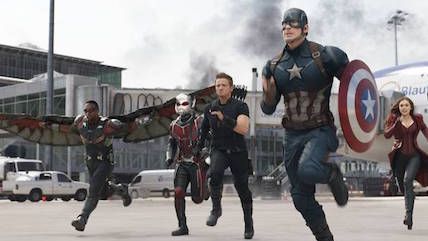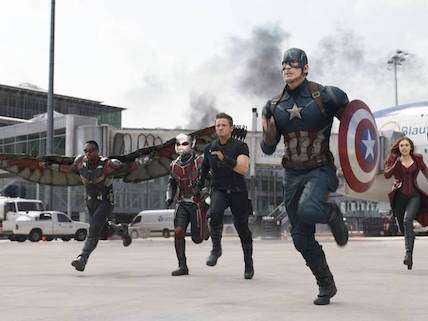Movie Review: Captain America: Civil War
Avengers reassemble.


(Spoiler note: Those wishing to know nothing about a movie prior to seeing it might want to steer clear of reviews before doing so.)
Captain America: Civil War is packed with enough blockbuster super-stuff—scads of characters, oodles of travelogue mileage, and acres of eye-punishing shakey-cam action—to fuel two movies. But Civil War is of course only one movie, and so its excess of just about everything overwhelms its virtues.
As has been the case ever since the Marvel Cinematic Universe was launched eight years ago, with Iron Man, this film is another way station en route to some sort of super-duper Avengers movie of the indeterminate future. Whether that galactic wrap-up will ever actually be reached is teasingly uncertain: a pair of purportedly climactic Infinity War films are in the works, but keep in mind that the Avengers' comic-book exploits have been going on for more than 50 years. Anyway, in this third Captain America picture, a crowd of familiar faces is once again assembled. That it's such a large crowd is one of the movie's problems.
Chris Evans and Robert Downey Jr. are back, of course, still appealing as straight-edge Steve Rogers/Captain America and quip-slinging industrialist Tony Stark/Iron Man. Scarlett Johansson returns as the butt-slamming Black Widow, Anthony Mackie and Don Cheadle fly in as the Falcon and War Machine, Paul Bettany reprises the charmingly synthetic Vision, Elizabeth Olsen is the telekinetic Scarlet Witch, and Jeremy Renner is briefly on hand as Hawkeye (still standing up to the forces of interstellar evil with nothing more than a bow and arrows). A couple of Avengers are missing in action— Thor is still back home in Asgard and the Hulk is vaguely indisposed—but three newbies do a nice job of taking up the slack. Paul Rudd's Ant-Man features in one of the movie's more inventive action scenes, and Chadwick Boseman's formidable Black Panther adds at least iconic heft to the proceedings. Best of all, perhaps, is 19-year-old Tom Holland's giddy Spider-Man—a character finally freed from his bondage in the foundered Sony franchise.
This time out, the team is caught up in an ethical issue of the sort that comic books are able to present with such simple clarity. The question is pressing: should superheroes be applauded for protecting the world from alien assaults, or are they dangerous vigilantes who need to be reined in? (This conundrum was also addressed six weeks ago, although more glumly, in Batman v Superman: Dawn of Justice.) As fans will know, the Avengers have already wrought extensive destruction in New York City and the Eastern European country of Sokovia; and as the movie begins, we see them notching up more collateral damage in a raid in Nigeria to prevent the theft of a deadly biological weapon. The world has about had it with these people, and there are now calls for the Avengers to be brought under UN control.
The US Secretary of State (William Hurt) advises the team to sign on to this plan, and Tony Stark surprisingly agrees that they should. But the more staunchly libertarian Steve Rogers resists: subjecting the Avengers to the whims of international bureaucrats, he argues, could only prove disastrous. What ensues is not a "civil war," exactly, but Rogers and his supporters in the group do split off to continue their unhampered pursuit of world-threatening malefactors—at the risk of becoming international fugitives.
The plot evolves with the return of Rogers's old friend-turned-enemy Bucky Barnes, the Winter Soldier (Sebastian Stan). He's still in the grip of his World War II brainwashing and has now been reactivated as an assassin by a mysterious figure called Zemo (Daniel Brühl). Rogers gets some unexpected help in tracking these two from former S.H.I.E.L.D. agent Sharon Carter (a returning Emily VanCamp), the niece of his lost love of the 1940s, Peggy Carter.
This is a serviceable story, occasionally warmed with sentiment (Rogers flies to London to attend the aged Peggy's funeral) and often flecked with humor (Stark's visit to a Queens row house to recruit budding web-slinger Peter Parker is tartly funny: "So you're Spider-Boy," Stark dryly observes.) The overstuffed cast is a problem throughout, though: Johansson's Romanoff is sadly under-employed (where's her spinoff movie, anyway?), and Olsen's Scarlet Witch and Renner's Hawkeye barely have room to register. Stan's Bucky Barnes has a few heart-tugging moments, but he's still a dull character, as is Brühl's Zemo, who lacks villainous flamboyance.
It's nice that directors Anthony and Joe Russo and their writers, Christopher Markus and Stephen McFeely, have toned down the usual superhero real-estate-wreckage. But what they've replaced it with amounts to endless mano-a-mano fight scenes, all shot in a clichéd blur of handheld camerawork. There's some rousing action—especially an all-stops-out battle at a Leipzig airport, and a chase through a tunnel thick with speeding vehicles. But the leap-and-kick fisticuffs predominate, and over the course of nearly two and a half hours, they drag the picture down. By the time it wallows to a close, some viewers might feel little more than a sense of relief.
But does it matter? Civil War is just another stop on Marvel's march toward world super-flick domination, and stand-alone movies featuring Spider-Man, Thor, Ant-Man and Black Panther are already in the pipeline. Exhausted skeptics might wonder where it all will end. Or will it ever?


Show Comments (59)